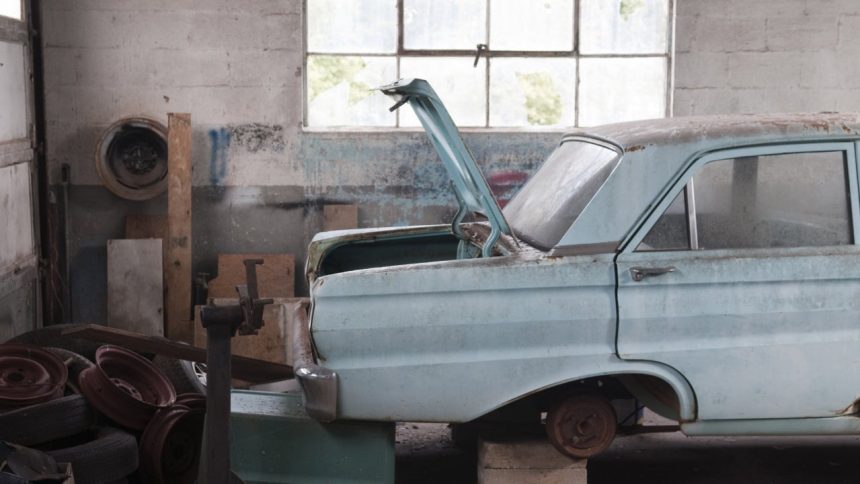WIN-Initiative/Getty Images
Key takeaways
- You cannot purchase car insurance for a car that has a salvage title; the car must be rebuilt and pass state inspection to get a new title before it is insurable.
- Not all insurers will insure a salvage car with a rebuilt title, and most car insurance companies will only offer you liability insurance on a salvage car that has a rebuilt title.
- If you have purchased a salvaged car from a dealership, it likely already has a rebuilt title.
What does salvage title mean for insurance?
You cannot get car insurance for a car with a salvage title. A salvage title car is a car that has been declared a total loss by an insurance company. To be declared a total loss, the vehicle must be damaged to the point that the cost of repairs would be more than the car is worth.
Although legal specifications vary by state, a salvage certificate is typically issued when the insurer deems a car totaled. When this happens, an insurance company usually takes possession of the vehicle and sells it to a mechanic or other party who will then use it for parts or repair it for resale.
Typically, when you purchase a salvaged car from a dealer, it has probably been issued a rebuilt title. This means the vehicle has already been fixed and inspected for use on a public road. To be issued a rebuilt title, cars must pass the state-mandated inspection, as well.
If you are purchasing a salvaged car from an auction, it may still need repairs, and it is important to verify with your state’s Department of Motor Vehicles (DMV) what is required to get the vehicle road safe.
Either way, a salvage title will be required because it lets potential buyers know that the car has suffered extensive damage in the past or has been declared a total loss by an insurance company. A vehicle may be totaled if:
- The vehicle has been in an accident that requires repairs exceeding the actual cash value of the vehicle.
- The vehicle has been damaged in a weather event, such as a hurricane, and the cost of repairs exceeds the actual cash value of the vehicle.
- The vehicle has been vandalized and the cost of repairs exceeds the actual cash value of the vehicle.
- The vehicle has been damaged to the point that it is inoperable and unsafe without complete body and frame repairs—usually costing beyond 70 percent of the vehicle’s value and thus exceeding the total loss threshold (which varies by state).
Can you get insurance for a salvage title?
It’s not possible to get car insurance for a vehicle with a salvage title. Insurance companies usually offer limited insurance options for cars with a rebuilt title, though. You can convert a salvage vehicle title to a rebuilt one by repairing what is broken so that it passes the state inspection. Once a vehicle has been fixed and inspected for safety, it may qualify for a rebuilt title, which usually allows you to obtain your state’s minimum liability coverage.
Insurance coverage options for rebuilt vehicles
To find out what kinds of insurance are available for your rebuilt vehicle, it’s best to speak with a licensed insurance agent.
Some insurance companies may refuse to provide collision or comprehensive, or physical damage, coverage because those types of coverage pay to repair the insured’s vehicle after an at-fault accident or other incidents and a vehicle with a rebuilt title is considered too risky to insure.
Physical damage insurance usually covers any damage that comes from things like a collision, fire or theft. If a company is willing to provide physical damage coverage, an adjuster may ask to evaluate the car and require you to provide detailed information on the prior damage. In addition, the insurance premium could be high while your vehicle’s value may be low.
You should be able to obtain minimum coverage liability insurance for a car with a rebuilt title. Liability insurance is required in all states except New Hampshire to drive your car legally on public roads.
How much is insurance for a salvage title?
If you’re looking to buy insurance for salvage title cars, you should take the time to shop around and compare quotes. Keep in mind that insurers usually won’t offer comprehensive or collision coverage for salvage vehicles, so you’ll likely only qualify to purchase minimum coverage.
The national average cost of minimum coverage auto insurance as of August 2025 is $808 per year or $67 per month, according to Quadrant Information Services, an insurance data analytics firm. However, you can expect to pay more than that to insure a salvage car. Salvage cars can have issues that weren’t discovered and fixed when the vehicle was being rebuilt for road-readiness, and those issues increase the risk of further accidents. Insurers price policies based on risk; hence, salvage vehicle insurance is typically more expensive.
You may be able to save money by selecting a higher deductible or by asking about discounts, such as discounts for bundling your auto policy with home insurance or taking a defensive driving course.
Steps to insure a salvage title vehicle
If you plan on purchasing a salvage title vehicle, you may want to follow these steps to obtain insurance:
- Inspect the salvage vehicle: Thoroughly examine the vehicle’s exterior and interior and make note of any obvious repairs or damages for your own records.
- Take photos of the damaged vehicle: In the event the vehicle is damaged in the future, photographic evidence of the condition the vehicle is in at the time of purchase could be beneficial.
- Get a certified mechanic’s statement: Certified mechanics have passed exams testing their vehicle knowledge. Hire a mechanic like this to complete a full inspection of your vehicle. Once repairs have been completed, ask the mechanic to provide a written statement ensuring the vehicle is in working order and considered safe for the road.
- Apply for a rebuilt title: When your vehicle has been repaired and you have a mechanic’s statement that it is road safe, you may apply for a rebuilt title through the DMV. Each state will have its own requirements, fees and application process.
- Shop for coverage: Once your vehicle has a rebuilt title, you could begin shopping for coverage at different auto insurance companies. Most companies will only offer liability insurance. If you want full coverage, you may need to shop around and compare quotes because it may be costly to obtain physical damage coverage on a previously salvaged vehicle. In fact, many companies refuse to offer full coverage because it is usually hard to determine a payout amount in the event of a future claim.
Can you make a claim on a salvage title car?
You can’t get car insurance for vehicles with a salvage title. However, if you have car insurance for a rebuilt title car, you are generally still able to file a claim in the event of a future incident. Whether the insurance company will pay out on that claim depends on the type of coverage you purchased. Most insurance companies will only provide liability coverage, which does not provide any physical damage coverage for your vehicle.
If you do have collision and comprehensive insurance, it may be important to understand that your vehicle’s value is likely substantially lower than a non-salvaged vehicle. Before making a claim, consider discussing the incident with your insurance agent to determine if the claim payout would be worth any consequences resulting from making the claim, such as an increase in your insurance premium.
Tips for buying a salvage car
If you are thinking about buying a salvage car, here are a few tips to consider before you make your purchase:
- Research your state’s specific laws when it comes to purchasing a salvage car, including lemon laws, title requirements and insurance requirements.
- Run the Vehicle Identification Number (VIN) through a service like CARFAX to get detailed information on any prior damage or accidents.
- Hire a certified mechanic to inspect the vehicle and ask them to provide you with a full report on any damage, potential safety concerns, and a cost estimate for repairs.
Frequently asked questions
Why we ask for feedback
Your feedback helps us improve our content and services. It takes less than a minute to
complete.
Your responses are anonymous and will only be used for improving our website.
Help us improve our content
Read the full article here














